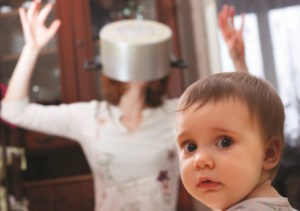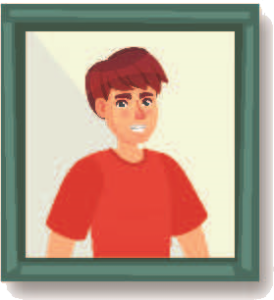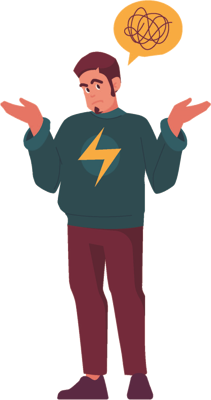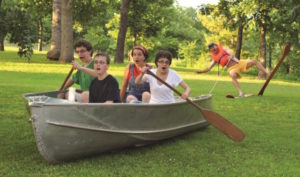How We Survived as an Undiagnosed ADHD Family
Cynthia Hammer, MSW
Attention Magazine February 2023
Download PDF
 We existed as a family for fifteen years before realizing some of us had ADHD. How did we do it? Although life after diagnosis and treatment is not easy, I look back in wonder at what we went through before in staying married, raising our children, and maintaining a family life. Reviewing our life has been helpful as I tell myself, “You’ve come a long way, baby!”
We existed as a family for fifteen years before realizing some of us had ADHD. How did we do it? Although life after diagnosis and treatment is not easy, I look back in wonder at what we went through before in staying married, raising our children, and maintaining a family life. Reviewing our life has been helpful as I tell myself, “You’ve come a long way, baby!”
In our family, the mother—that’s me—and two of our three sons were diagnosed with ADHD, while word is still out on the father. I “diagnosed” him, but he refused the diagnosis. After I got treatment, I became aware of his “ADHD-like” behaviors. Earlier I didn’t notice them; now they irritated me! Other couples, where one is diagnosed and the other isn’t, say this is a common experience. Like the reformed smoker who no longer tolerates even the smell of smoke, my “improved self,” who had been blithely unaware of the ADHD behaviors in those around me, is now hypervigilant in insisting that they shape up.
Partners in ADHD
My husband, Steve, is aware that he is forgetful. When our oldest son said that his father has lost everything he owns at least once, he laughingly agreed. However, he would rather believe he has early Alzheimer’s disease than to think he has ADHD. I can’t understand why he feels this way. There is no good treatment for Alzheimer’s while there are several effective treatments for ADHD. At any event, it is an irrelevant argument. After I point out his ADHD-like behaviors, he works to change them.
My approach isn’t as sweet and benign as it may sound. I say, “Prove to me you don’t have ADHD by never being late again… by not telling me you’ll be home in ten minutes only to appear one hour later… or by not planning to accomplish fifteen things in the next two hours while you sit here using up thirty of those minutes.”
Before my own diagnosis and treatment, whenever I waited for my husband I would get involved in a project and lose track of time. He would end up waiting for me. Dr. Ned Hallowell says ADHD in both partners can work very well, and in some ways, he’s right. Spouses with untreated ADHD are generally tolerant of one another’s behaviors. We are too caught up in our own world to notice or care about what’s going on with those around us. Having little time for each other, not following through on commitments, making last minute plans, or being a day late and a dollar short is a way of life for each partner. The “fit” between them is workable. I used to have a number of fender benders but never worried about Steve getting upset as he had his share of them, too. Can the pot call the kettle black?
We learned not to make snide remarks about lost car keys, as we couldn’t determine who misplaced them more often. We had a number of household sets but still couldn’t find them. We improved—he has his set and I have mine (although I continue to think he loses his more often).
The erroneous idea persists that if you are doing well, you can’t have anything wrong with you. Using society’s standards and judging by external appearances, we were doing well. Steve is a general surgeon and I have a master’s degree in social work, but we were struggling. I had no idea that our lives were more chaotic, disorganized, and difficult than for others. Then our children arrived.
Life with children when you and they have ADHD
Our first-born son did not have ADHD; he was high achieving and capable, and we were proud of him. We were bewildered, stymied, and drained—mentally, physically, and emotionally—by our other two sons, however.
Here are some of my memories as an undiagnosed ADHD mother raising two undiagnosed ADHD sons.
Problem one: No space of my own
Several years ago I heard a presentation on the losses people experience when moving into a nursing home. We were asked what space in our homes was our special place, a space that was recognized as ours and that no one violated or entered without permission. I realized I had no special place. My sons with ADHD didn’t recognize boundaries. I told them to stay out of my purse, out of my closet, out of my room, to not to use my possessions without asking, all to no avail. I knocked before entering their rooms, but they were incapable of extending this courtesy to me. My husband and I resigned ourselves, begrudgingly, to this state of affairs, although periodically we continued to work on it.
 For our oldest son their violation of his space and possessions caused continual family stress. He got angry at us. “Why don’t you do something about it?” As I write this, I wonder why we didn’t do something. Why didn’t we get him a key to his room? Our house is old; the original door keys were lost. It required taking the door latch to a locksmith, which was more complicated than this ADHD mom could manage. Being naive and idealistic, I didn’t want to think one family member had to lock his room against two other family members. Foolishly, I thought more time and effort on my part would solve the problem. The younger boys would learn to respect the rights of others. How my thinking has changed!
For our oldest son their violation of his space and possessions caused continual family stress. He got angry at us. “Why don’t you do something about it?” As I write this, I wonder why we didn’t do something. Why didn’t we get him a key to his room? Our house is old; the original door keys were lost. It required taking the door latch to a locksmith, which was more complicated than this ADHD mom could manage. Being naive and idealistic, I didn’t want to think one family member had to lock his room against two other family members. Foolishly, I thought more time and effort on my part would solve the problem. The younger boys would learn to respect the rights of others. How my thinking has changed!
Because my two ADHD sons believed they wouldn’t care if someone took their stuff without asking, they never accepted that others might feel differently. They continually assumed the owner wouldn’t mind, and I, repeatedly, told them, “I thought” and “I assumed” were unacceptable responses. They needed to ask. Of course, if the item they “borrowed” was lost or broken, well, that was that, unless someone (such as me, the mom) put in the time and energy to require the offending party to replace it and to make sure they did. I couldn’t manage that kind of consistency and follow through.
Problem two: Public embarrassment and shame
I still remember our first meal at a Mexican restaurant where we made a reasonable semblance of a nice family out to dinner. Our two youngest sons were nine and eleven. While waiting for our meal, salsa and chips were brought to our table and they stayed seated (miracle upon miracles). We talked and ate chips and didn’t get angry at them. Typically, these sons fought with each other, verbally and physically, while we waited for our food. Woe to the restaurant that took too long! We would remember and mark it down as a place where we wouldn’t return. The restaurant owners probably were relieved we gave them a black mark and wouldn’t be returning.
 Usually, after ordering the food and awaiting its arrival, we sent the younger boys “out” to do whatever they did. Then my husband, our oldest son, and I acted like a “normal family,” quietly waiting for our food. When it arrived, one of us would look for the other two boys and invite them back to the table. Invariably, they told tales of how they found a quarter by crawling under the cigarette machine, how one hit the other and that in hitting him back, they accidentally hit another patron and gotten bawled out, or how they left the water running in the bathroom sink and it was now spilling onto the floor.
Usually, after ordering the food and awaiting its arrival, we sent the younger boys “out” to do whatever they did. Then my husband, our oldest son, and I acted like a “normal family,” quietly waiting for our food. When it arrived, one of us would look for the other two boys and invite them back to the table. Invariably, they told tales of how they found a quarter by crawling under the cigarette machine, how one hit the other and that in hitting him back, they accidentally hit another patron and gotten bawled out, or how they left the water running in the bathroom sink and it was now spilling onto the floor.
Sports activities provided similar experiences. Our family is athletic, and all our sons played soccer. The middle son, although a good player when the ball came his way, invariably had his mind on other things when the ball was elsewhere on the field. His favorite pastime was looking for a four-leaf clover. As the ball came up the field, his dad, his coach, and other parents anxiously and sometimes angrily shouted at him, “Pay attention!” “Keep your mind on the game.” “The ball’s coming your way!”
Our other son with ADHD had outstanding ability, but also an attitude and an impulsive mouth. If the coach said something he didn’t like, he would say something back. His coach was a no-nonsense, I-am-the-boss kind of person. He dealt with our son by letting us know we were deficient parents for having a child that was so insolent. He told us that if our child were his, such behavior would have been beaten or threatened out of him long ago. Word would go up and down the line of parents about what our son said or did that provoked the coach. Although our son was the star player on the team, going to his games brought us no pleasure. We tensely anticipated the coach’s displeasure.
Problem three: My forgetfulness
There are numerous incidents of my sons forgetting things they needed to do, but the forgetting incidents I remember are mine. It has taken years for me to forgive myself for these forgetful incidents and to share them with you.
When he was four years old, my oldest son (the one without ADHD) attended a Montessori preschool held in the teacher’s home. I dropped him off one morning at the front gate and drove off. Two hours later a neighbor near the school called. School was closed that day (I had forgotten) and my son was sitting on the steps waiting for my return. He hadn’t gone inside the neighbor’s house (she was impressed with his training), but he gave her my phone number so she could call me. I was embarrassed with my son—what an irresponsible mother I was—and embarrassed with the neighbor, who must have thought the same thing.
Several years later my youngest son, then age nine, started a new school. I drove him to school on the first day, thinking he would take the bus home. When he didn’t appear by 4 PM, I called the bus system. They hadn’t seen him. I called the school principal at home. He didn’t know our son’s whereabouts. I called my husband and let him know our youngest son was missing. In desperation, I drove to the school, three miles away, to look for him. He had been “missing” for two and a half hours. About half a mile from the school, I saw my son, cheerfully walking home. I honked. He came over and got into the car, and I burst into tears. I had to pull into a parking lot. I was crying too hard to see well enough to drive. A concerned woman driver pulled up to ask if everything was all right. I explained that everything was fine now that my son, who I had thought lost, was found.
My tears were tears of relief that I wasn’t a total screw-up and tears of happiness that he was safe. My son looked at me quizzically. He was embarrassed by my crying, by my show of emotion regarding his well-being. He said, “It’s no big deal. It’s nothing to cry about. You said you’d pick me up after school, but when you didn’t show up, I went to the Y and then decided to walk home.” Although he had been to the Y numerous times in the car, he had never walked there. He had no fear and had total self-confidence about getting himself home.
Our middle son showed similar independence (and poor judgment). I remember shopping with him at the mall when he was two years old. He wandered away in the courtyard, exploring the trash containers, planters, benches and people. I watched to see when he would remember his mother, to feel anxious that he was alone, to be scared he couldn’t find me. Fifteen minutes passed, and he was still engrossed and content in his solo wanderings. I needed to go so I called him, and he reluctantly came.

I COULD GO ON ABOUT OUR FAMILY TRAVAILS, but I think you get the picture. Those of you living in families with ADHD are not alone! In the midst of this turmoil, three of us got diagnosed and treated for ADHD. That has made a world of difference. As one of my sons with ADHD says, “People with ADHD (untreated) know what to do, they just can’t get themselves to do it.” We are a treated family now. Everyone in our family has learned about ADHD and we have learned to do what we know we should do.
 Cynthia Hammer, MSW, is executive director of the Inattentive ADHD Coalition, a nonprofit organization with a mission that children with inattentive ADHD are diagnosed by age eight and adults with inattentive ADHD are readily and correctly diagnosed when they seek help. The website is www.iadhd.org.
Cynthia Hammer, MSW, is executive director of the Inattentive ADHD Coalition, a nonprofit organization with a mission that children with inattentive ADHD are diagnosed by age eight and adults with inattentive ADHD are readily and correctly diagnosed when they seek help. The website is www.iadhd.org.
Other Articles in this Edition
Hyperfocus in College Students with ADHD
Summer Camp as a Growth Experience for Your Child
Learning How to Learn: The Magic of a Summer Program
Living Black with Undiagnosed and Untreated ADHD
ADHD and the Increasing Suicide Rate Among Black Youth
How We Survived as an Undiagnosed ADHD Family
